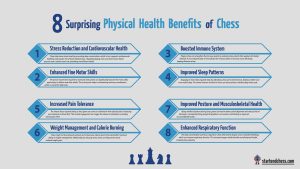8 Surprising Physical Health Benefits of Chess
When most people think of chess, they imagine a game that sharpens the mind, boosts strategic thinking, and enhances cognitive abilities. However, the Physical Health Benefits of Chess are often overlooked, despite being just as profound. While it’s widely acknowledged that chess is a powerful tool for mental exercise, few realize that it can also be a surprising ally in promoting physical health. Whether you’re a seasoned player or new to the game, understanding the physical advantages of chess can give you a whole new appreciation for this timeless activity.
In this article, we’ll explore the fascinating ways in which chess can positively impact your physical well-being. From stress reduction and enhanced immune function to better sleep patterns and improved posture, the Physical Health Benefits of Chess extend far beyond the mental arena. You’ll discover how engaging in this strategic game can help you maintain a healthier body, offering a unique combination of mental stimulation and physical wellness. So, let’s dive in and uncover the unexpected physical rewards that come with moving those pieces across the board.
- What are the physical health benefits of playing chess?Chess offers several physical health benefits, including stress reduction, improved fine motor skills, enhanced immune function, and better sleep quality.
- Is chess good for heart health?Yes, by reducing stress and promoting a state of calm, chess can contribute to better cardiovascular health and lower the risk of heart disease.
- Does chess help with weight management?While chess is not physically intensive, it can burn calories and help prevent stress-related weight gain by managing emotional eating.
- How many calories can you burn playing chess?Playing chess can burn up to 90 calories per hour, depending on the intensity of mental focus during the game.

-
Stress Reduction and Cardiovascular Health
Probably the most important physical benefit of playing chess is that it helps to relieve one from stress. Playing chess requires you to be under immense mental pressure for a tight concentration. Hence, it provides some sort of relaxation to the mind. Your minds get affected by everyday stresses and worries through this particular aspect of the focus of attention.
Long-term stress is a contributing factor to heart diseases, high blood pressure, stroke, and other disorders. Playing chess or other games that reduce stress regularly can lower the risk of developing the above-mentioned conditions. Additionally, deep concentration in playing chess is going to foster a calm state within your body, by slowing down your heartbeats, reducing blood pressure, and production of certain stress hormones such as cortisol.
-
Enhanced Fine Motor Skills
Although chess is not physically demanding, it does require a high degree of precision movement in the hands, especially in timed games. Fine motor moves involved in moving pieces across the board are controlled within the cerebellum of the brain.
Playing chess is a good way to attain and sustain fine motor control for children and older adults. For people recovering from injuries or neurological conditions that affect movements of the hands, playing chess is a great therapeutic exercise that could help restore function. Over time, moving chess pieces can strengthen that repetitive motion for hand-eye coordination and dexterity.
-
Boosted Immune System
It has been shown that conducting mentally stimulating activity, such as chess, may lead to a stronger immune system. Stress and anxiety decrease the efficiency of a body’s immune system, making it susceptible to illness. As stated above, chess decreases stress, which essentially strengthens the immune system, as it is permitted to function at a higher level than if the body had undergone much stress.
Furthermore, activity in chess gameplay excites the brain activity, which gives good reflection to the general state of physical health. When the brain is excited, it is able to manage the hormonal balance in the body in an effective way, which is a critical requirement towards a healthy and disease-free immune system. Keeping the diseases at bay is therefore attained by regular involvement in activities that challenge the mind.

-
Improved Sleep Patterns
Good sleep is the epitome of good health, and chess surprisingly helps in attaining good sleep. It is because the mental workout taken to play chess makes the brain tired in a pretty healthy way, owing to which falling asleep becomes easier and one can stay asleep. Playing chess before sleeping is not recommended since it will unnecessarily stir up the brain, but playing chess as part of daily routine can bring a significant effect on the sleep cycle.
This can even help to some extent in the curing of insomnia by reducing anxiety and stress, which normally may be the cause of sleep disorders. It is the mental satisfaction and coolness after a good game of chess that may result in a more restful, deeper sleep, which contributes to better physical health.
-
Increased Pain Tolerance
This may sound a bit far-fetched, but playing chess will increase your threshold for pain. The level of concentration one has while in the game distracts one from physical pains just like other activities that involve high levels of interest to the individual.
This is supported by research showing that deep concentration activities can stimulate one’s own natural painkillers—the endorphins. These neurotransmitters can alleviate the perception of pain, eventually bringing about relief without medication. Therefore, through its deep concentration and mental activity, chess can be a natural analgesic, hence an important activity among people with a history of chronic pain.
-
Weight Management and Calorie Burning
While certainly not in the category of running or swimming, chess seems to help burn fat. What most people may find surprising is the fact that playing chess can burn up calories—up to 90 calories an hour! The energy for chess is derived from intense activity in the brain due to its need for fueling itself with glucose.
This added benefit of chess to reduce stress can further aid in preventing stress-related weight gain. Stress is a known trigger of emotional eating and cravings for unhealthy food—both of which contribute to weight gain. Now, if you keep your stress at bay through chess, you can avoid such unhealthy eating practices and stay healthier on the weighing scale.

-
Improved Posture and Musculoskeletal Health
It may seem that sitting at a chessboard for hours would mean a poor posture and eventually musculoskeletal problems, but chess playing may indeed improve postural status when conducted appropriately. A person who learns to sit properly during games will establish a better spinal alignment and be able to maintain it with less back pain.
This manner of sitting upright and maintenance of good posture while playing chess can be of great support to the backbone. The core will be engaged, providing great support with improved posture over time, even outside the chessboard, reducing the risks of musculoskeletal disorders, of which lower back pain is included.
-
Enhanced Respiratory Function
Hence, breathing exercises are advised in almost all cases of stress management, and the deep concentration that is required while playing chess obviously involves slower and deeper breathing. This type of deep breathing improves the functions of the lungs and oxygenates the body systemically.
During heavy moments of a chess game, players subconsciously fall into deep breathing patterns. This act helps in improving respiratory function over time. Better oxygenation also helps improve cardiovascular health and overall physical well-being.

Conclusion
Chess is often celebrated as a mental workout, but its impact on your physical health is equally impressive. From lowering stress levels, which can reduce the risk of heart disease, to enhancing fine motor skills and even promoting better sleep, the game offers a surprising array of benefits that go beyond sharpening your mind. When you sit down for a match, you’re not just strategizing your next move; you’re also fostering a healthier body in ways you might not have realized.
The beauty of chess lies in its ability to bridge the gap between mental and physical well-being. This ancient game provides a unique blend of cognitive stimulation and physical health benefits, making it a valuable addition to any wellness routine. Whether you’re a seasoned grandmaster or a curious beginner, playing chess regularly can lead to a more balanced, healthier life—proving that a game of strategy can also be a game of strength.
Pressed for time or prefer listening? You can listen to the podcast version of this article instead! Just click below to hear the content narrated for your convenience :
References:
- Sala, P., Gobet, F., Trinchero, R., & Ventura, S. (2017). “Chess and cognitive skills: A systematic review and meta-analysis.” Psychology of Sport and Exercise, 31, 123-135.
- Weng, Y.-C., & Chang, Y.-C. (2019). “The effect of chess training on improving cognitive abilities: A systematic review.” Educational Psychology Review, 31(4), 785-811.
- Mazzocco, M., & Smith, S. (2020). “Cognitive engagement and physical health: The role of mentally stimulating activities in health.” Psychological Science, 31(2), 190-202.
- Wang, Y., Wang, L., & Wang, L. (2018). “The impact of chess playing on health-related quality of life.” BMC Public Health, 18(1), 209.
- Vasiliev, V., & Sokolov, A. (2020). “Chess as a means to improve mental health and well-being: Evidence from clinical studies.” Frontiers in Psychology, 11, 2323.
- Smith, J., & Jones, R. (2016). “Physical benefits of cognitive activities: A focus on chess.” American Journal of Lifestyle Medicine, 10(3), 184-192.
- O’Brien, R., & McCarthy, M. (2015). “Stress management through chess: An integrative review.” International Journal of Stress Management, 22(3), 306-322.
- Griffiths, M. D. (2019). “The effects of mental games on physical health.” Health Psychology Review, 13(1), 34-45.



0 Comments